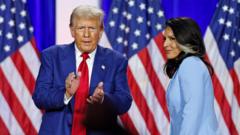The recent appointments made by Donald Trump as he prepares for his second term in office reveal a complex landscape of loyalty intersected by competing political agendas among his selected team. This diverse group exemplifies the balancing act Trump must perform as he reestablishes himself within the White House. Various factions have emerged, hinting at the underlying tensions that may surface in Trump's governance.
**Deep State Leaders:** Within this faction, figures like Matt Gaetz, Tulsi Gabbard, and Robert F. Kennedy Jr. have made their mark as outspoken critics of the previous administration, particularly Biden's policies. Gaetz, potentially nominated as the attorney general, has stirred controversy with ongoing ethics investigations and a history of aggressive political actions. Gabbard's transition from the Democratic Party to Trump's camp emphasizes her military background and critiques of U.S. foreign strategies. Meanwhile, Kennedy, known for his non-mainstream views, particularly concerning health and environmental policies, aligns closely with those pushing for a substantial reduction in government bureaucracy. Collectively, their ambition to dismantle the "deep state" echoes Trump's own rhetoric but may lead to friction within their bureaucratic roles.
**Border Policy Advocates:** Tom Homan, Stephen Miller, and Kristi Noem represent the administration's hardline stance on immigration. Their heavy emphasis on enhancing border security implies a sharp increase in deportations and strict enforcement, possibly setting Trump up for conflict with immigrant-friendly states. Polls indicate that immigration remains a key concern among constituents, but the intense policies proposed could incite pushback from regions reliant on immigrant labor, creating potential hurdles for the administration.
**Tech Advocates:** The appointment of Elon Musk and Vivek Ramaswamy reflects a commitment to libertarian principles advocating for reduced government oversight. Musk's ambitious cost-cutting initiatives could significantly reshape government spending, yet the feasibility of such sweeping changes remains uncertain. Ramaswamy's radical proposals, including the abolition of various government departments, may encounter resistance as they could clash with broader policy frameworks, especially regarding essential services.
**China Faction:** With Marco Rubio, Mike Waltz, and John Ratcliffe at the helm, Trump’s foreign policy towards China indicates a hawkish approach. The group's unified criticism of China’s growing influence underscores a determination to impose tougher economic sanctions and tariffs. However, Trump's past flirtations with a more conciliatory approach towards Beijing could lead to internal contradictions within his administration, especially considering Rubio and Gabbard's differing views on foreign intervention.
In conclusion, while Trump's cabinet is undoubtedly filled with loyal supporters, the underlying factions with their distinct agendas may complicate his ability to govern effectively. The interplay between their ambitions and the need for coherent decision-making will be critical in shaping the direction of Trump’s next term. As the administration takes shape, it's clear that navigating these competing visions will be one of Trump's significant tests ahead.






















